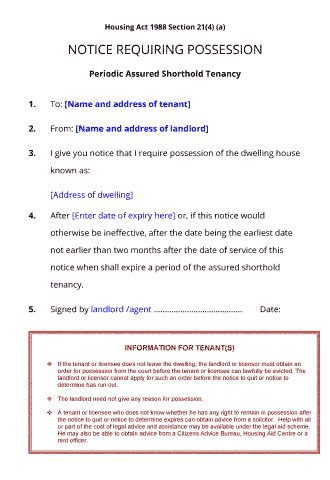Section 21(a) notice

Document overview

 England & Wales
England & Wales

- Length:1 pages (400 words)
- Available in:
 Microsoft Word DOCX
Microsoft Word DOCX Apple Pages
Apple Pages RTF
RTF

If the document isn’t right for your circumstances for any reason, just tell us and we’ll refund you in full immediately.

We avoid legal terminology unless necessary. Plain English makes our documents easy to understand, easy to edit and more likely to be accepted.

You don’t need legal knowledge to use our documents. We explain what to edit and how in the guidance notes included at the end of the document.

Email us with questions about editing your document. Use our Lawyer Assist service if you’d like our legal team to check your document will do as you intend.

Our documents comply with the latest relevant law. Our lawyers regularly review how new law affects each document in our library.
About this Section 21(a) Notice
Note: this form is only suitable for use where the tenancy agreement is effective before 1 October 2015. For tenancies created after this date, use Form 6A instead. We continue to make this document available for landlords with older AST agreements.
For tenancies created before October 2015, this is the form that landlords must use to serve notice to quit once the fixed term has ended. A Section 21(a) Possession Notice must be in a prescribed format and must be completed correctly to be valid.
Use this document either to regain possession of a property, or to end a tenancy agreement for the purposes of arranging a new one with the same tenants.
The law in this document
This Section 21(a) Notice complies with the Housing Act 1988 and the Housing Act 1996.
There are two Section 21 notices, each to be used in a different circumstance. A Section 21(a) notice is only valid if the fixed term of the tenancy has expired and the tenants are renting on a periodic basis.
When to use this Section 21 Notice
This document is suitable for a landlord who has let his or her property under an Assured Shorthold Tenancy agreement (AST), where the fixed term of the tenancy has expired and a periodic tenancy is in place.
The alternative Section 21(b) Notice should be used if the notice will be served to the tenants before the fixed term of the tenancy ends. You may like to read our article on How, when and why to serve a Section 21 notice, which explains in more detail the difference between a fixed and a periodic tenancy.
For example, the fixed term of a 6 month tenancy starting on 1 August would expire on 1 February. If the landlord wanted to serve notice before 1 February, he or she should use a Section 21(b) Notice. If it is now after 1 February (the tenants have continued to live in the property on a periodic basis), then this Section 21(a) Notice should be used.
Whichever Section 21 Notice is used, the landlord must give the tenants at least 2 months notice, so in our example, to have the tenants move out on 1 February, a Section 21(b) Notice must be served before 1 November, and a Section 21(a) Notice served on 2 February would end the tenancy on 2 April. A Section 21(b) notice served on 1 January would mean that the earliest the tenants would move out would be 1 March.
A Section 21 notice is the only valid way of ending an assured shorthold tenancy where the tenants have not breached the tenancy agreement. It must also be completed in a prescribed format (we explain how to do this in our guidance notes) in order to be valid. Your tenant may be able to refuse to leave the property if you don’t serve the notice correctly.
Section 21(a) Notice features and contents
- Recognised by courts: follows the official prescribed format
- Use to end a tenancy and agree new terms with previous tenants (e.g. a rent increase)
- Remains valid indefinitely until a new agreement is signed with the tenants

Recent reviews
Choose the level of support you need
Document Only
This document
Detailed guidance notes explaining how to edit each paragraph
Lawyer Assist
This document
Detailed guidance notes explaining how to edit each paragraph
Unlimited email support - ask our legal team any question related to completing the document
- Review of your edited document by our legal team including:
- reporting on whether your changes comply with the law
- answering your questions about how to word a new clause or achieve an outcome
- checking that your use of defined terms is correct and consistent
- correcting spelling mistakes
- reformatting the document ready to sign
All rights reserved
